The Cambridge History of China. Vol. 12: Republican China, 1912-1949, Part 1
Подождите немного. Документ загружается.

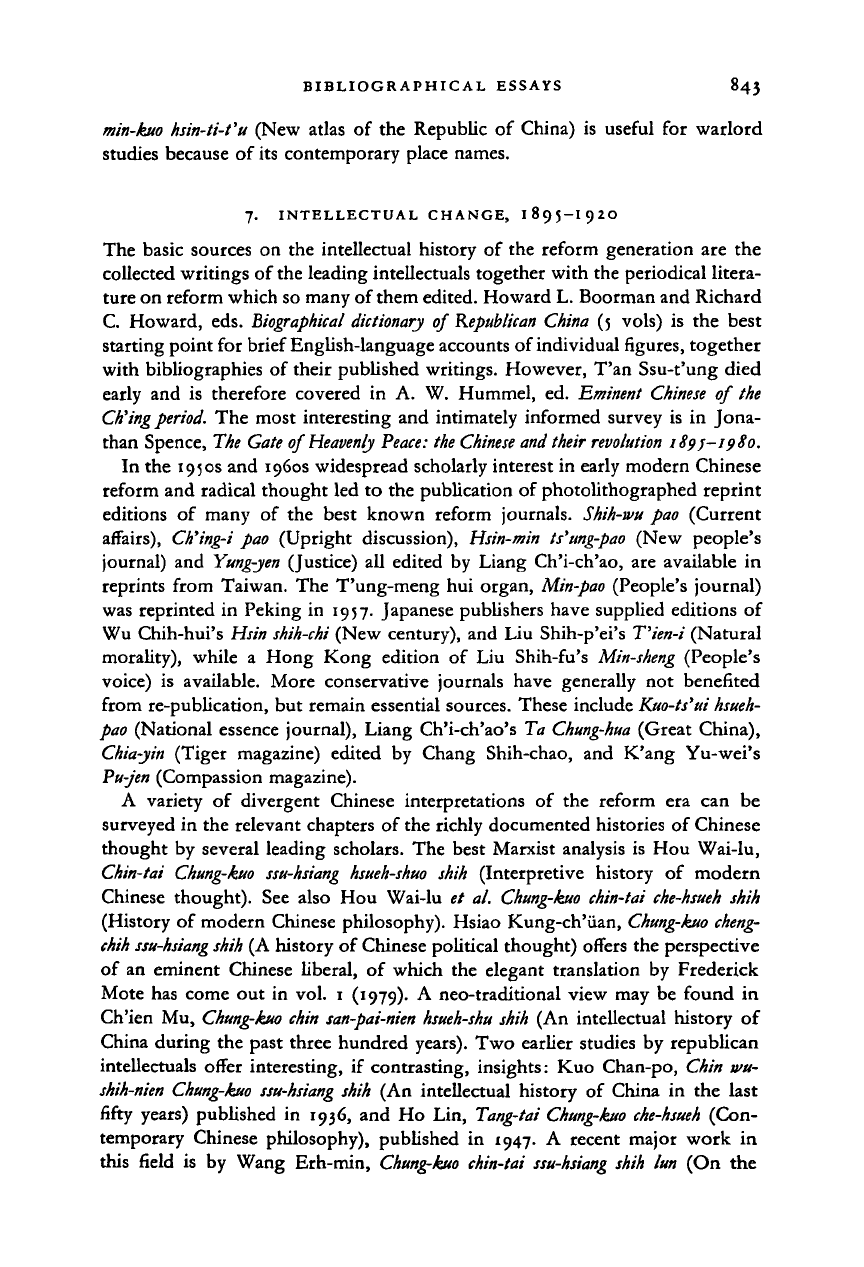
BIBLIOGRAPHICAL ESSAYS 843
min-kuo hsin-ti-t'u (New atlas of the Republic of China) is useful for warlord
studies because of its contemporary place names.
7. INTELLECTUAL CHANGE, 1895-I920
The basic sources on the intellectual history of the reform generation are the
collected writings of the leading intellectuals together with the periodical litera-
ture on reform which so many of them edited. Howard L. Boorman and Richard
C. Howard, eds. Biographical dictionary of Republican China (5 vols) is the best
starting point for brief English-language accounts of individual figures, together
with bibliographies of their published writings. However, T'an Ssu-t'ung died
early and is therefore covered in A. W. Hummel, ed. Eminent
Chinese
of the
Ch
y
ing
period.
The most interesting and intimately informed survey is in Jona-
than Spence, The Gate of
Heavenly
Peace: the
Chinese
and their
revolution
i8pj-rp8o.
In the 1950s and 1960s widespread scholarly interest in early modern Chinese
reform and radical thought led to the publication of photolithographed reprint
editions of many of the best known reform journals.
Shih-wu
pao (Current
affairs), Ch'ing-i pao (Upright discussion), Hsin-min
ts'ung-pao
(New people's
journal) and
Yung-yen
(Justice) all edited by Liang Ch'i-ch'ao, are available in
reprints from Taiwan. The T'ung-meng hui organ,
Min-pao
(People's journal)
was reprinted in Peking in 1957. Japanese publishers have supplied editions of
Wu Chih-hui's Hsin
shih-chi
(New century), and Liu Shih-p'ei's
T'ien-i
(Natural
morality), while a Hong Kong edition of Liu Shih-fu's
Min-sheng
(People's
voice) is available. More conservative journals have generally not benefited
from re-publication, but remain essential sources. These include Kuo-ts'ui
hsueh-
pao (National essence journal), Liang Ch'i-ch'ao's Ta
Chung-hua
(Great China),
Chia-yin (Tiger magazine) edited by Chang Shih-chao, and K'ang Yu-wei's
Pu-jen
(Compassion magazine).
A variety of divergent Chinese interpretations of the reform era can be
surveyed in the relevant chapters of the richly documented histories of Chinese
thought by several leading scholars. The best Marxist analysis is Hou Wai-lu,
Chin-tai Chung-kuo ssu-hsiang hsueh-shuo shih (Interpretive history of modern
Chinese thought). See also Hou Wai-lu et al. Chung-kuo chin-tai che-hsueh shih
(History of modern Chinese philosophy). Hsiao Kung-ch'iian,
Chung-kuo
cheng-
chih ssu-hsiang shih
(A history of Chinese political thought) offers the perspective
of an eminent Chinese liberal, of which the elegant translation by Frederick
Mote has come out in vol. 1 (1979). A neo-traditional view may be found in
Ch'ien Mu, Chung-kuo chin san-pai-nien hsueh-shu shih (An intellectual history of
China during the past three hundred years). Two earlier studies by republican
intellectuals offer interesting, if contrasting, insights: Kuo Chan-po, Chin wu-
shih-nien Chung-kuo ssu-hsiang
shih (An intellectual history of China in the last
fifty years) published in 1936, and Ho Lin,
Tang-tai Chung-kuo che-hsueh
(Con-
temporary Chinese philosophy), published in 1947. A recent major work in
this field is by Wang Erh-min, Chung-kuo chin-tai ssu-hsiang shih lun (On the
Cambridge Histories Online © Cambridge University Press, 2008
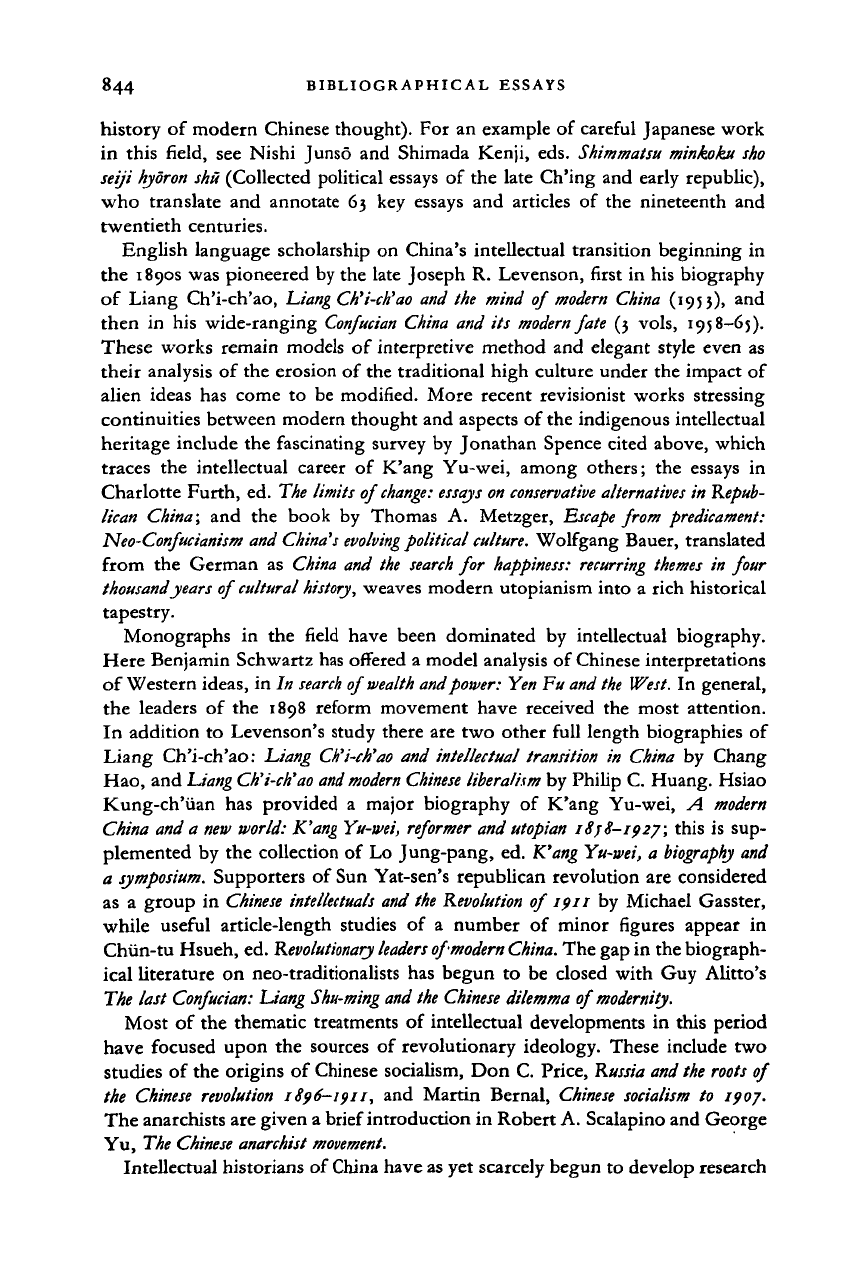
844 BIBLIOGRAPHICAL ESSAYS
history of modern Chinese thought). For an example of careful Japanese work
in this field, see Nishi Junso and Shimada Kenji, eds. Shimmatsu minkoku
sho
seiji
hydron
shu (Collected political essays of the late Ch'ing and early republic),
who translate and annotate 63 key essays and articles of the nineteenth and
twentieth centuries.
English language scholarship on China's intellectual transition beginning in
the 1890s was pioneered by the late Joseph R. Levenson, first in his biography
of Liang Ch'i-ch'ao, Liang
Ch'i-ch'ao
and the mind of
modern
China (1953), and
then in his wide-ranging
Confucian China
and its
modern
fate (3 vols, 1958-65).
These works remain models of interpretive method and elegant style even as
their analysis of the erosion of the traditional high culture under the impact of
alien ideas has come to be modified. More recent revisionist works stressing
continuities between modern thought and aspects of the indigenous intellectual
heritage include the fascinating survey by Jonathan Spence cited above, which
traces the intellectual career of K'ang Yu-wei, among others; the essays in
Charlotte Furth, ed. The
limits
of
change:
essays on conservative alternatives
in
Repub-
lican China; and the book by Thomas A. Metzger,
Escape
from
predicament:
Neo-Confucianism and China's evolving political
culture.
Wolfgang Bauer, translated
from the German as
China
and the
search
for
happiness:
recurring themes
in four
thousand years of
cultural
history,
weaves modern utopianism into a rich historical
tapestry.
Monographs in the field have been dominated by intellectual biography.
Here Benjamin Schwartz has offered a model analysis of Chinese interpretations
of Western ideas, in In
search
of
wealth
and power: Yen Fu
and the
West. In general,
the leaders of the 1898 reform movement have received the most attention.
In addition to Levenson's study there are two other full length biographies of
Liang Ch'i-ch'ao: Liang
Ch'i-ch'ao
and
intellectual transition
in China by Chang
Hao,
and Liang
Ch'i-ch'ao and modern Chinese liberalism
by Philip C. Huang. Hsiao
Kung-ch'uan has provided a major biography of K'ang Yu-wei, A modern
China and a
new
world:
K'ang
Yu-wei,
reformer
and
Utopian
18^8-1927; this is sup-
plemented by the collection of Lo Jung-pang, ed. K'ang Yu-wei, a
biography and
a
symposium.
Supporters of Sun Yat-sen's republican revolution are considered
as a group in
Chinese intellectuals
and
the Revolution
of
1911
by Michael Gasster,
while useful article-length studies of a number of minor figures appear in
Chun-tu Hsueh, ed.
Revolutionary leaders of'modern
China.
The gap in the biograph-
ical literature on neo-traditionalists has begun to be closed with Guy Alitto's
The last
Confucian:
Liang
Shu-ming and the Chinese dilemma
of
modernity.
Most of the thematic treatments of intellectual developments in this period
have focused upon the sources of revolutionary ideology. These include two
studies of the origins of Chinese socialism, Don C. Price, Russia
and the roots
of
the
Chinese revolution
1896-1911, and Martin Bernal,
Chinese socialism
to 1907.
The anarchists are given a brief introduction in Robert A. Scalapino and George
Yu, The
Chinese anarchist
movement.
Intellectual historians of China have as yet scarcely begun to develop research
Cambridge Histories Online © Cambridge University Press, 2008
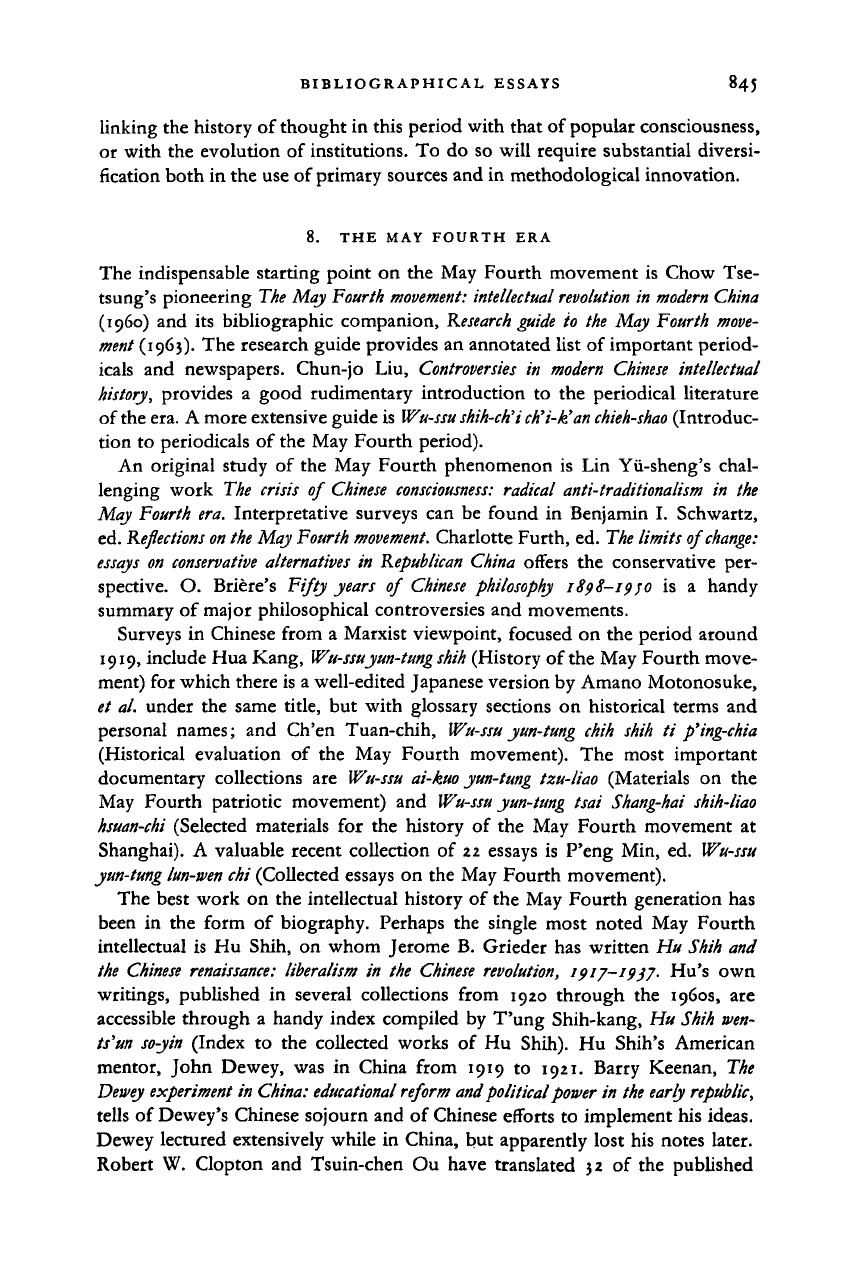
BIBLIOGRAPHICAL ESSAYS 845
linking the history of thought in this period with that of popular consciousness,
or with the evolution of institutions. To do so will require substantial diversi-
fication both in the use of primary sources and in methodological innovation.
8. THE MAY FOURTH ERA
The indispensable starting point on the May Fourth movement is Chow Tse-
tsung's pioneering The May Fourth movement: intellectual
revolution
in modern China
(i960) and its bibliographic companion,
Research guide
to the May Fourth
move-
ment
(1963). The research guide provides an annotated list of important period-
icals and newspapers. Chun-jo Liu, Controversies in modern Chinese intellectual
history, provides a good rudimentary introduction to the periodical literature
of the era. A more extensive guide is
Wu-ssu shih-ch'i ch'i-k'an chieh-shao
(Introduc-
tion to periodicals of the May Fourth period).
An original study of the May Fourth phenomenon is Lin Yii-sheng's chal-
lenging work The crisis of Chinese
consciousness:
radical anti-traditionalism in the
May Fourth
era.
Interpretative surveys can be found in Benjamin I. Schwartz,
ed. Reflections
on
the May Fourth movement. Charlotte Furth, ed. The limits of change:
essays on conservative alternatives in Republican China offers the conservative per-
spective. O. Briere's Fifty years of Chinese philosophy 1898-19;o is a handy
summary of major philosophical controversies and movements.
Surveys in Chinese from a Marxist viewpoint, focused on the period around
1919,
include Hua Kang, Wu-ssu
yun-tung shih
(History of the May Fourth move-
ment) for which there is a well-edited Japanese version by Amano Motonosuke,
et al. under the same title, but with glossary sections on historical terms and
personal names; and Ch'en Tuan-chih, Wu-ssu yun-tung chih shih ti p'ing-chia
(Historical evaluation of the May Fourth movement). The most important
documentary collections are Wu-ssu
ai-kuo yun-tung
tzu-liao (Materials on the
May Fourth patriotic movement) and Wu-ssu yun-tung tsai Shang-hai shih-liao
hsuan-chi
(Selected materials for the history of the May Fourth movement at
Shanghai). A valuable recent collection of 22 essays is P'eng Min, ed. Wu-ssu
yun-tung lun-wen chi
(Collected essays on the May Fourth movement).
The best work on the intellectual history of the May Fourth generation has
been in the form of biography. Perhaps the single most noted May Fourth
intellectual is Hu Shih, on whom Jerome B. Grieder has written Hu Shih and
the Chinese renaissance: liberalism in the Chinese revolution, 1917-19)7. Hu's own
writings, published in several collections from 1920 through the 1960s, are
accessible through a handy index compiled by T'ung Shih-kang, Hu Shih
wen-
ts'un
so-yin
(Index to the collected works of Hu Shih). Hu Shih's American
mentor, John Dewey, was in China from 1919 to 1921. Barry Keenan, The
Dewey experiment in China: educational reform and political power in the early republic,
tells of Dewey's Chinese sojourn and of Chinese efforts to implement his ideas.
Dewey lectured extensively while in China, but apparently lost his notes later.
Robert W. Clopton and Tsuin-chen Ou have translated 32 of the published
Cambridge Histories Online © Cambridge University Press, 2008
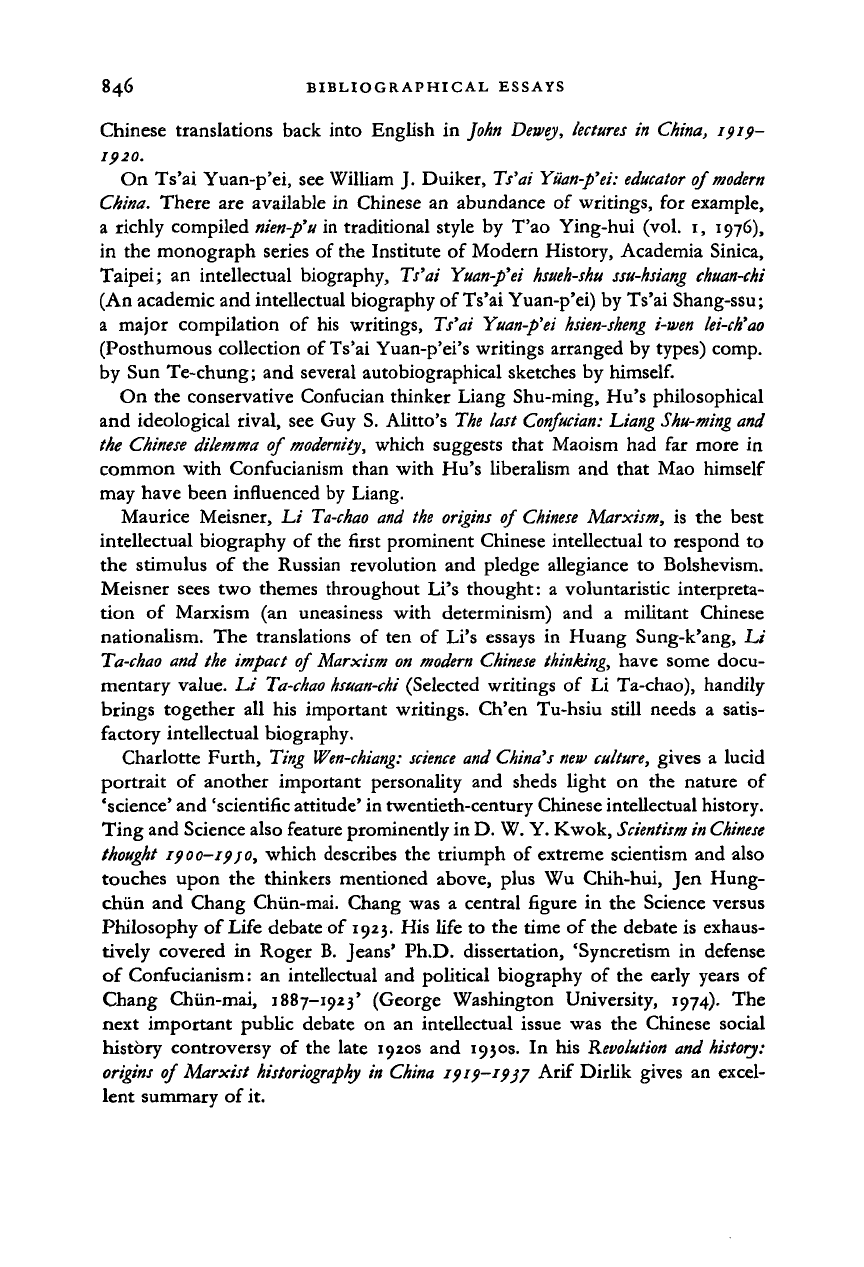
846 BIBLIOGRAPHICAL ESSAYS
Chinese translations back into English in John
Dewey,
lectures
in China, 1919-
1920.
On Ts'ai Yuan-p'ei, see William J. Duiker, Ts'ai
Yuan-p'ei:
educator
of
modern
China. There are available in Chinese an abundance of writings, for example,
a richly compiled
nien-p'u
in traditional style by T'ao Ying-hui (vol. 1, 1976),
in the monograph series of the Institute of Modern History, Academia Sinica,
Taipei; an intellectual biography, Ts'ai Yuan-p'ei
hsueh-shu ssu-hsiang chuan-chi
(An academic and intellectual biography of Ts'ai Yuan-p'ei) by Ts'ai Shang-ssu;
a major compilation of his writings, Ts'ai Yuan-p'ei
hsien-sheng
i-wen
lei-ch'ao
(Posthumous collection of Ts'ai Yuan-p'ei's writings arranged by types) comp.
by Sun Te-chung; and several autobiographical sketches by
himself.
On the conservative Confucian thinker Liang Shu-ming, Hu's philosophical
and ideological rival, see Guy S. Alitto's The last
Confucian:
Liang
Shu-ming and
the
Chinese
dilemma of
modernity,
which suggests that Maoism had far more in
common with Confucianism than with Hu's liberalism and that Mao himself
may have been influenced by Liang.
Maurice Meisner, Li
Ta-chao
and the
origins
of
Chinese
Marxism, is the best
intellectual biography of the first prominent Chinese intellectual to respond to
the stimulus of the Russian revolution and pledge allegiance to Bolshevism.
Meisner sees two themes throughout Li's thought: a voluntaristic interpreta-
tion of Marxism (an uneasiness with determinism) and a militant Chinese
nationalism. The translations of ten of Li's essays in Huang Sung-k'ang, Li
Ta-chao
and the impact of Marxism on
modern Chinese
thinking, have some docu-
mentary value. Li
Ta-chao hsuan-chi
(Selected writings of Li Ta-chao), handily
brings together all his important writings. Ch'en Tu-hsiu still needs a satis-
factory intellectual biography.
Charlotte Furth, Ting
Wen-chiang:
science
and
China's new
culture,
gives a lucid
portrait of another important personality and sheds light on the nature of
'science' and 'scientific attitude' in twentieth-century Chinese intellectual history.
Ting and Science also feature prominently in D. W. Y. Kwok,
Scientism
in
Chinese
thought 1900-19jo, which describes the triumph of extreme scientism and also
touches upon the thinkers mentioned above, plus Wu Chih-hui, Jen Hung-
chiin and Chang Chiin-mai. Chang was a central figure in the Science versus
Philosophy of Life debate of 1923. His life to the time of the debate is exhaus-
tively covered in Roger B. Jeans' Ph.D. dissertation, 'Syncretism in defense
of Confucianism: an intellectual and political biography of the early years of
Chang Chiin-mai, 1887-1923' (George Washington University, 1974). The
next important public debate on an intellectual issue was the Chinese social
history controversy of the late 1920s and 1930s. In his devolution and
history:
origins
of Marxist
historiography
in
China
1919-19}? Arif Dirlik gives an excel-
lent summary of it.
Cambridge Histories Online © Cambridge University Press, 2008
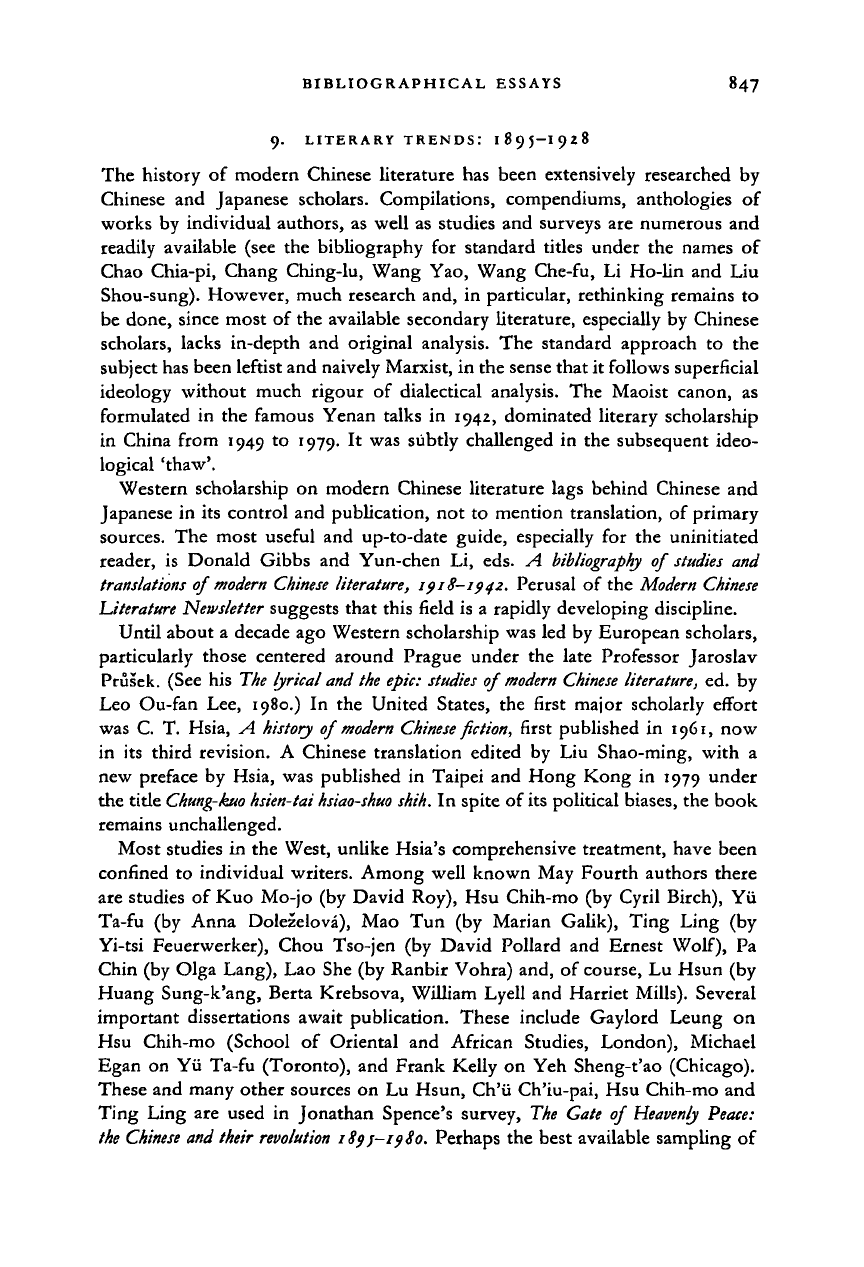
BIBLIOGRAPHICAL ESSAYS 847
9. LITERARY TRENDS: 1895-1928
The history of modern Chinese literature has been extensively researched by
Chinese and Japanese scholars. Compilations, compendiums, anthologies of
works by individual authors, as well as studies and surveys are numerous and
readily available (see the bibliography for standard titles under the names of
Chao Chia-pi, Chang Ching-lu, Wang Yao, Wang Che-fu, Li Ho-lin and Liu
Shou-sung). However, much research and, in particular, rethinking remains to
be done, since most of the available secondary literature, especially by Chinese
scholars, lacks in-depth and original analysis. The standard approach to the
subject has been leftist and naively Marxist, in the sense that it follows superficial
ideology without much rigour of dialectical analysis. The Maoist canon, as
formulated in the famous Yenan talks in 1942, dominated literary scholarship
in China from 1949 to 1979. It was subtly challenged in the subsequent ideo-
logical 'thaw'.
Western scholarship on modern Chinese literature lags behind Chinese and
Japanese in its control and publication, not to mention translation, of primary
sources. The most useful and up-to-date guide, especially for the uninitiated
reader, is Donald Gibbs and Yun-chen Li, eds. A
bibliography
of
studies
and
translations of modern Chinese literature, 1918-1942. Perusal of the Modern Chinese
'Literature Newsletter suggests that this field is a rapidly developing discipline.
Until about a decade ago Western scholarship was led by European scholars,
particularly those centered around Prague under the late Professor Jaroslav
Prusek. (See his The lyrical and the epic: studies of
modern
Chinese literature, ed. by
Leo Ou-fan Lee, 1980.) In the United States, the first major scholarly effort
was C. T. Hsia, A.
history
of
modern Chinese
fiction,
first published in 1961, now
in its third revision. A Chinese translation edited by Liu Shao-ming, with a
new preface by Hsia, was published in Taipei and Hong Kong in 1979 under
the title
Chung-kuo hsien-tai hsiao-shuo
shih.
In spite of
its
political biases, the book
remains unchallenged.
Most studies in the West, unlike Hsia's comprehensive treatment, have been
confined to individual writers. Among well known May Fourth authors there
are studies of Kuo Mo-jo (by David Roy), Hsu Chih-mo (by Cyril Birch), Yii
Ta-fu (by Anna Dolezelova), Mao Tun (by Marian Galik), Ting Ling (by
Yi-tsi Feuerwerker), Chou Tso-jen (by David Pollard and Ernest Wolf), Pa
Chin (by Olga Lang), Lao She (by Ranbir Vohra) and, of course, Lu Hsun (by
Huang Sung-k'ang, Berta Krebsova, William Lyell and Harriet Mills). Several
important dissertations await publication. These include Gaylord Leung on
Hsu Chih-mo (School of Oriental and African Studies, London), Michael
Egan on Yii Ta-fu (Toronto), and Frank Kelly on Yeh Sheng-t'ao (Chicago).
These and many other sources on Lu Hsun, Ch'ii Ch'iu-pai, Hsu Chih-mo and
Ting Ling are used in Jonathan Spence's survey, The Gate of
Heavenly
Peace:
the Chinese and their revolution 189J-19S0. Perhaps the best available sampling of
Cambridge Histories Online © Cambridge University Press, 2008
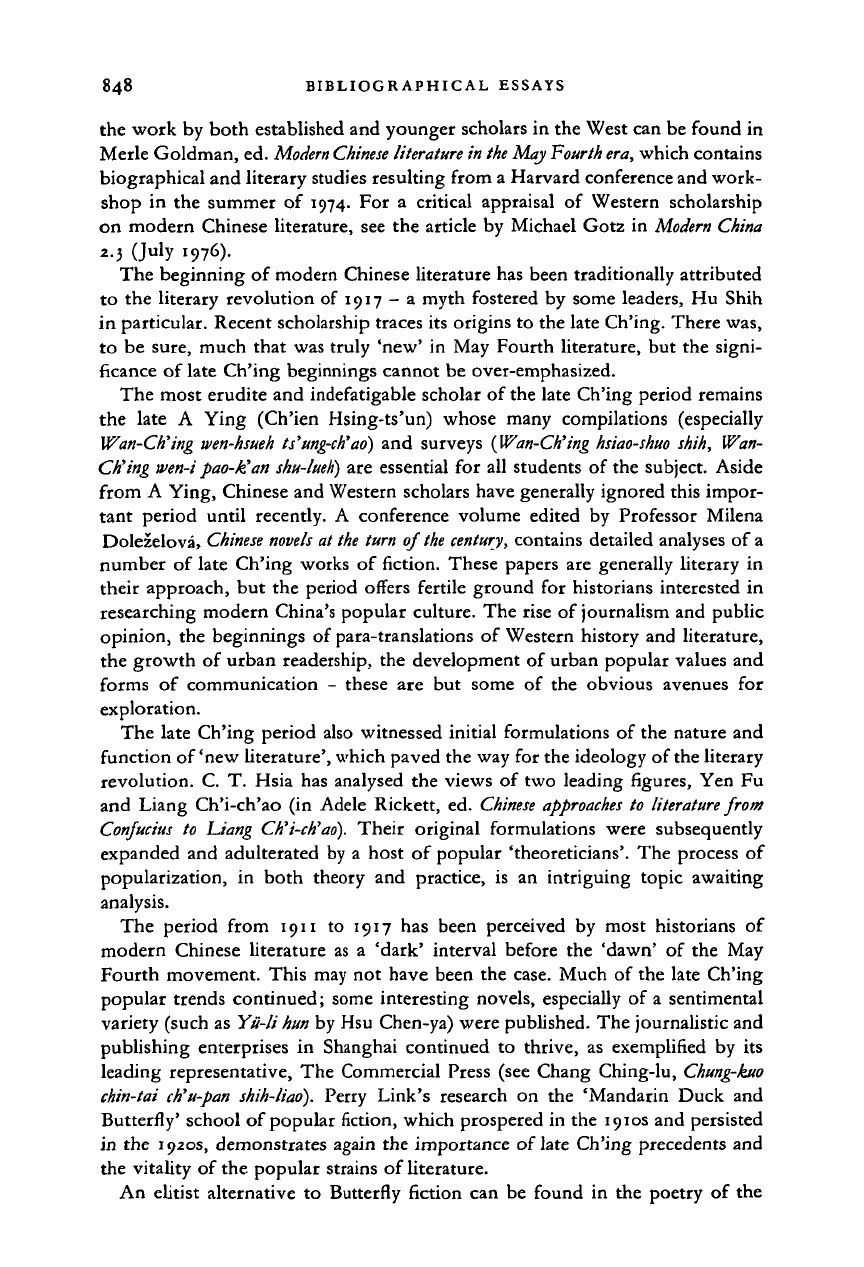
BIBLIOGRAPHICAL ESSAYS
the work by both established and younger scholars in the West can be found in
Merle Goldman, ed. Modern
Chinese
literature in the May Fourth era, which contains
biographical and literary studies resulting from a Harvard conference and work-
shop in the summer of 1974. For a critical appraisal of Western scholarship
on modern Chinese literature, see the article by Michael Gotz in
Modern China
2.3 (July 1976).
The beginning of modern Chinese literature has been traditionally attributed
to the literary revolution of 1917 - a myth fostered by some leaders, Hu Shih
in particular. Recent scholarship traces its origins to the late Ch'ing. There was,
to be sure, much that was truly 'new' in May Fourth literature, but the signi-
ficance of late Ch'ing beginnings cannot be over-emphasized.
The most erudite and indefatigable scholar of the late Ch'ing period remains
the late A Ying (Ch'ien Hsing-ts'un) whose many compilations (especially
Wan-Ch'ing wen-hsueh ts'ung-ch'ad) and surveys {Wan-Ch'ing
hsiao-shuo
shih, Wan-
Ch'ing
wen-i
pao-k'an
shu-lueh)
are essential for all students of the subject. Aside
from A Ying, Chinese and Western scholars have generally ignored this impor-
tant period until recently. A conference volume edited by Professor Milena
Dolezelova,
Chinese novels
at
the
turn of
the
century,
contains detailed analyses of a
number of late Ch'ing works of fiction. These papers are generally literary in
their approach, but the period offers fertile ground for historians interested in
researching modern China's popular culture. The rise of journalism and public
opinion, the beginnings of para-translations of Western history and literature,
the growth of urban readership, the development of urban popular values and
forms of communication - these are but some of the obvious avenues for
exploration.
The late Ch'ing period also witnessed initial formulations of the nature and
function of 'new literature', which paved the way for the ideology of the literary
revolution. C. T. Hsia has analysed the views of two leading figures, Yen Fu
and Liang Ch'i-ch'ao (in Adele Rickett, ed.
Chinese approaches
to
literature
from
Confucius
to Liang
Ch'i-ch'ao).
Their original formulations were subsequently
expanded and adulterated by a host of popular 'theoreticians'. The process of
popularization, in both theory and practice, is an intriguing topic awaiting
analysis.
The period from 1911 to 1917 has been perceived by most historians of
modern Chinese literature as a 'dark' interval before the 'dawn' of the May
Fourth movement. This may not have been the case. Much of the late Ch'ing
popular trends continued; some interesting novels, especially of a sentimental
variety (such as Yu-li
him
by Hsu Chen-ya) were published. The journalistic and
publishing enterprises in Shanghai continued to thrive, as exemplified by its
leading representative, The Commercial Press (see Chang Ching-lu,
Chung-kuo
chin-tai
ch'u-pan
shih-liao).
Perry Link's research on the 'Mandarin Duck and
Butterfly' school of popular fiction, which prospered in the 1910s and persisted
in the 1920s, demonstrates again the importance of late Ch'ing precedents and
the vitality of the popular strains of literature.
An elitist alternative to Butterfly fiction can be found in the poetry of the
Cambridge Histories Online © Cambridge University Press, 2008
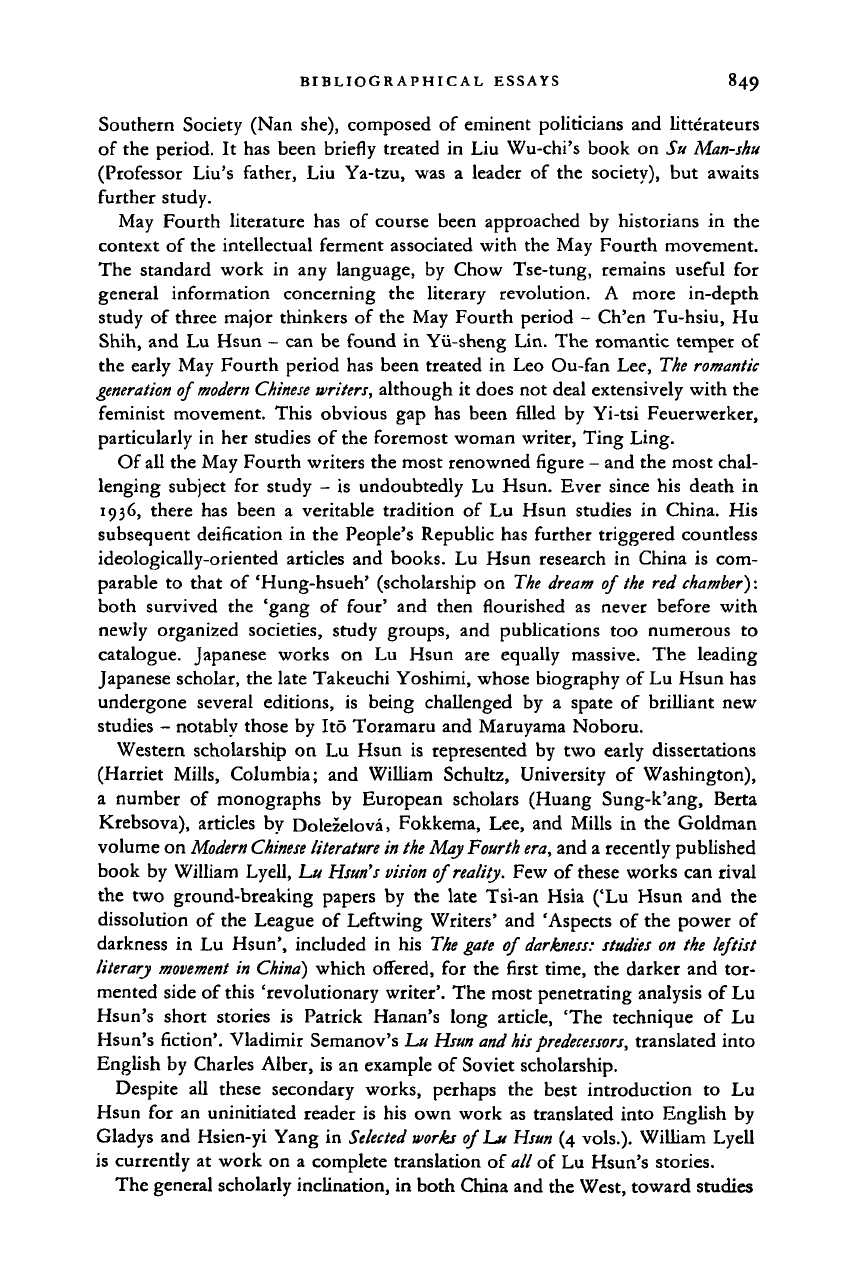
BIBLIOGRAPHICAL ESSAYS 849
Southern Society (Nan she), composed of eminent politicians and litterateurs
of the period. It has been briefly treated in Liu Wu-chi's book on Su Man-shu
(Professor Liu's father, Liu Ya-tzu, was a leader of the society), but awaits
further study.
May Fourth literature has of course been approached by historians in the
context of the intellectual ferment associated with the May Fourth movement.
The standard work in any language, by Chow Tse-tung, remains useful for
general information concerning the literary revolution. A more in-depth
study of three major thinkers of the May Fourth period - Ch'en Tu-hsiu, Hu
Shih, and Lu Hsun - can be found in Yii-sheng Lin. The romantic temper of
the early May Fourth period has been treated in Leo Ou-fan Lee, The
romantic
generation
of
modern Chinese
writers,
although it does not deal extensively with the
feminist movement. This obvious gap has been filled by Yi-tsi Feuerwerker,
particularly in her studies of the foremost woman writer, Ting Ling.
Of all the May Fourth writers the most renowned figure - and the most chal-
lenging subject for study - is undoubtedly Lu Hsun. Ever since his death in
1936,
there has been a veritable tradition of Lu Hsun studies in China. His
subsequent deification in the People's Republic has further triggered countless
ideologically-oriented articles and books. Lu Hsun research in China is com-
parable to that of 'Hung-hsueh' (scholarship on The
dream
of
the
red
chamber):
both survived the 'gang of four' and then flourished as never before with
newly organized societies, study groups, and publications too numerous to
catalogue. Japanese works on Lu Hsun are equally massive. The leading
Japanese scholar, the late Takeuchi Yoshimi, whose biography of Lu Hsun has
undergone several editions, is being challenged by a spate of brilliant new
studies - notably those by Ito Toramaru and Maruyama Noboru.
Western scholarship on Lu Hsun is represented by two early dissertations
(Harriet Mills, Columbia; and William Schultz, University of Washington),
a number of monographs by European scholars (Huang Sung-k'ang, Berta
Krebsova), articles by Dolezelova, Fokkema, Lee, and Mills in the Goldman
volume on
Modern Chinese literature
in
the May Fourth
era,
and a recently published
book by William Lyell, Lu
Hsun's vision
of
reality.
Few of these works can rival
the two ground-breaking papers by the late Tsi-an Hsia ('Lu Hsun and the
dissolution of the League of Leftwing Writers' and 'Aspects of the power of
darkness in Lu Hsun', included in his
The gate
of
darkness:
studies
on the leftist
literary movement
in
China)
which offered, for the first time, the darker and tor-
mented side of this 'revolutionary writer'. The most penetrating analysis of Lu
Hsun's short stories is Patrick Hanan's long article, 'The technique of Lu
Hsun's fiction'. Vladimir Semanov's Lu Hsun
and his
predecessors,
translated into
English by Charles Alber, is an example of Soviet scholarship.
Despite all these secondary works, perhaps the best introduction to Lu
Hsun for an uninitiated reader is his own work as translated into English by
Gladys and Hsien-yi Yang in
Selected works
of Lu
Hsun
(4 vols.). William Lyell
is currently at work on a complete translation of all of Lu Hsun's stories.
The general scholarly inclination, in both China and the West, toward studies
Cambridge Histories Online © Cambridge University Press, 2008
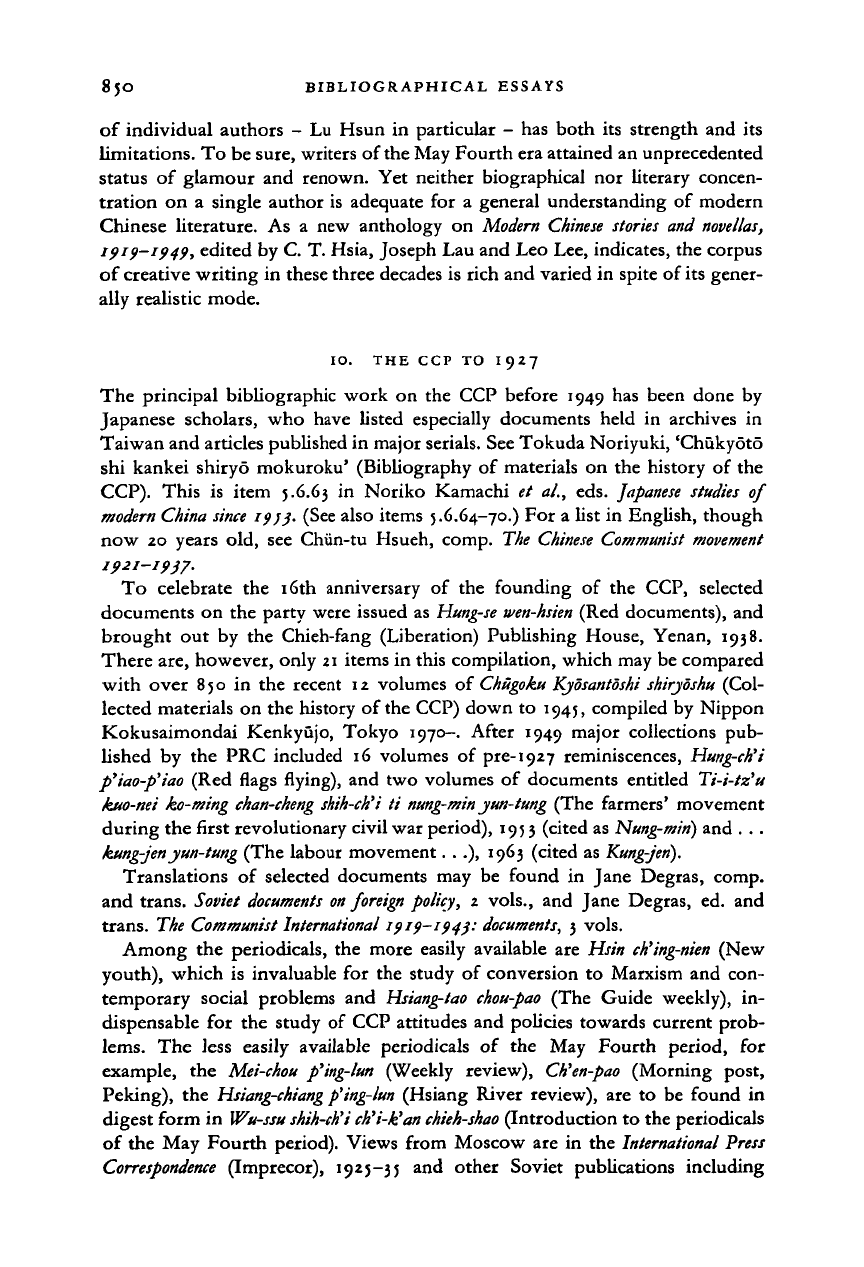
850 BIBLIOGRAPHICAL ESSAYS
of individual authors - Lu Hsun in particular - has both its strength and its
limitations. To be sure, writers of the May Fourth era attained an unprecedented
status of glamour and renown. Yet neither biographical nor literary concen-
tration on a single author is adequate for a general understanding of modern
Chinese literature. As a new anthology on Modern
Chinese stories
and
novellas,
1919-1949, edited by C. T. Hsia, Joseph Lau and Leo Lee, indicates, the corpus
of creative writing in these three decades is rich and varied in spite of its gener-
ally realistic mode.
10.
THE CCP TO 1927
The principal bibliographic work on the CCP before 1949 has been done by
Japanese scholars, who have listed especially documents held in archives in
Taiwan and articles published in major serials. See Tokuda Noriyuki, 'Chukyoto
shi kankei shiryo mokuroku' (Bibliography of materials on the history of the
CCP).
This is item
5.6.63
in Noriko Kamachi et al., eds.
Japanese
studies of
modern China since
1933. (See also items 5.6.64-70.) For a list in English, though
now 20 years old, see Chiin-tu Hsueh, comp. The
Chinese Communist movement
1921-1937.
To celebrate the 16th anniversary of the founding of the CCP, selected
documents on the party were issued as
Hung-se wen-hsien
(Red documents), and
brought out by the Chieh-fang (Liberation) Publishing House, Yenan, 1938.
There are, however, only
21
items in this compilation, which may be compared
with over
8 5 o
in the recent 12 volumes of
Chugoku Kyosantoshi shiryoshu
(Col-
lected materials on the history of the CCP) down to 1945, compiled by Nippon
Kokusaimondai Kenkyujo, Tokyo 1970-. After 1949 major collections pub-
lished by the PRC included 16 volumes of pre-1927 reminiscences, Hung-ch'i
p'iao-p'iao
(Red flags flying), and two volumes of documents entitled Ti-i-tz'u
kuo-nei ko-ming
chan-cheng shih-ch'i
ti nung-min yun-tung (The farmers' movement
during the first revolutionary civil war period), 1953 (cited as
Nung-min)
and . . .
kung-jenyun-tung
(The labour movement. . .), 1963 (cited as
Kung-jen).
Translations of selected documents may be found in Jane Degras, comp.
and trans. Soviet
documents on foreign
policy,
2 vols., and Jane Degras, ed. and
trans.
The
Communist International
1919-194}:
documents,
3 vols.
Among the periodicals, the more easily available are Hsin
ch'ing-nien
(New
youth),
which is invaluable for the study of conversion to Marxism and con-
temporary social problems and
Hsiang-fao chou-pao
(The Guide weekly), in-
dispensable for the study of CCP attitudes and policies towards current prob-
lems.
The less easily available periodicals of the May Fourth period, for
example, the
Mei-chou
p'ing-lun
(Weekly review), Ch'en-pao (Morning post,
Peking), the
Hsiang-chiang
p'ing-lun
(Hsiang River review), are to be found in
digest form in
Wu-ssu shih-ch'i ch'i-k'an chieh-shao
(Introduction to the periodicals
of the May Fourth period). Views from Moscow are in the
International Press
Correspondence
(Imprecor), 1925-35 and other Soviet publications including
Cambridge Histories Online © Cambridge University Press, 2008
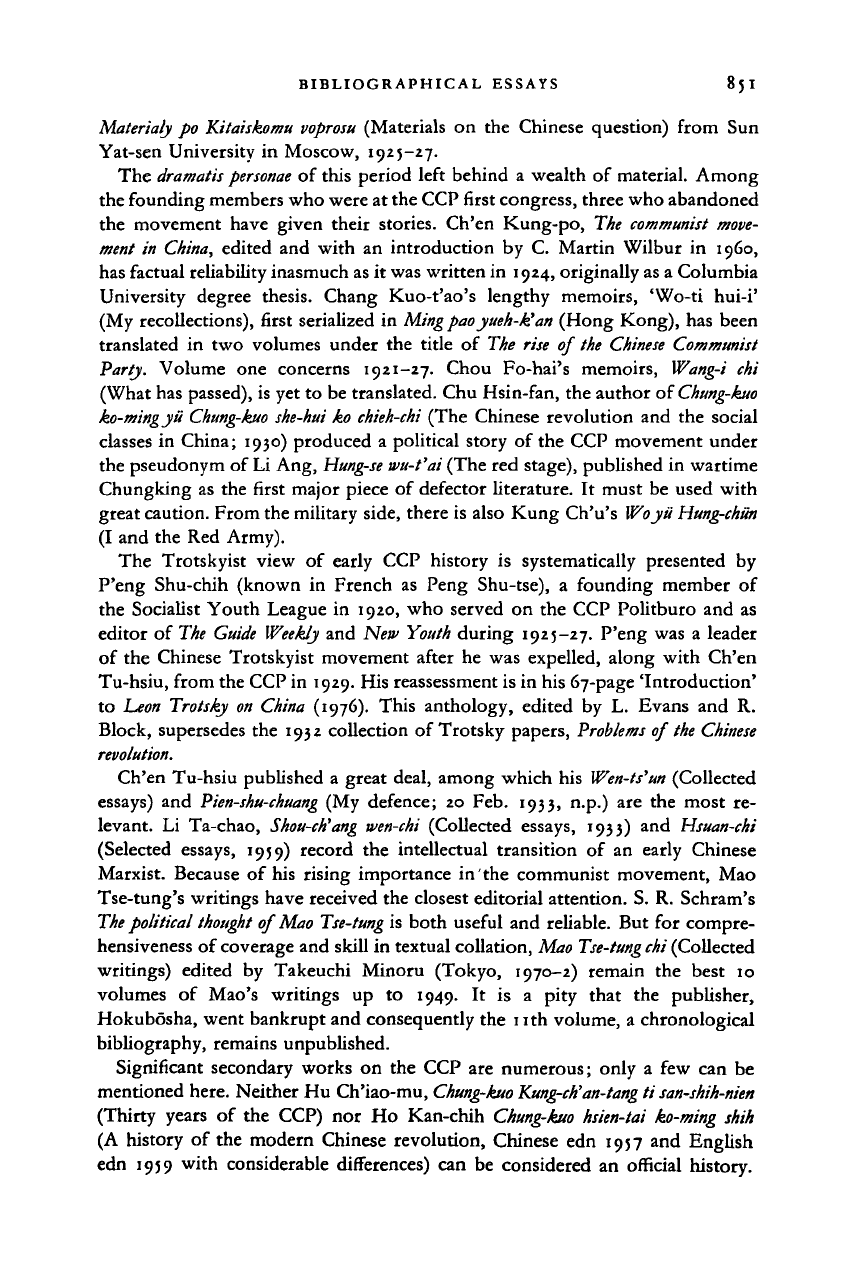
BIBLIOGRAPHICAL ESSAYS 8jl
Material}
po Kitaiskomu
voprosu
(Materials on the Chinese question) from Sun
Yat-sen University in Moscow, 1925-27.
The
dramatis personae
of this period left behind a wealth of material. Among
the founding members who were at the CCP first congress, three who abandoned
the movement have given their stories. Ch'en Kung-po, The
communist
move-
ment in
China,
edited and with an introduction by C. Martin Wilbur in i960,
has factual reliability inasmuch as it was written in 1924, originally as a Columbia
University degree thesis. Chang Kuo-t'ao's lengthy memoirs, 'Wo-ti hui-i'
(My recollections), first serialized in
Ming
pao yueh-k'an (Hong Kong), has been
translated in two volumes under the title of The rise of
the Chinese
Communist
Party. Volume one concerns 1921-27. Chou Fo-hai's memoirs, Wang-i chi
(What has passed), is yet to be translated. Chu Hsin-fan, the author of
Chung-kuo
ko-mittgjii
Chung-kuo she-hui
ko
chieh-chi
(The Chinese revolution and the social
classes in China; 1930) produced a political story of the CCP movement under
the pseudonym of Li Ang,
Hung-se
wu-t'ai (The red stage), published in wartime
Chungking as the first major piece of defector literature. It must be used with
great caution. From the military side, there is also Kung Ch'u's Wojii
Hung-chun
(I and the Red Army).
The Trotskyist view of early CCP history is systematically presented by
P'eng Shu-chih (known in French as Peng Shu-tse), a founding member of
the Socialist Youth League in 1920, who served on the CCP Politburo and as
editor of
The Guide
Weekly and New Youth during 1925-27. P'eng was a leader
of the Chinese Trotskyist movement after he was expelled, along with Ch'en
Tu-hsiu, from the CCP in 1929. His reassessment is in his 67-page 'Introduction'
to Leon Trotsky on China (1976). This anthology, edited by L. Evans and R.
Block, supersedes the 1932 collection of Trotsky papers,
Problems
of
the Chinese
revolution.
Ch'en Tu-hsiu published a great deal, among which his
Wen-ts'un
(Collected
essays) and
Pien-shu-chuang
(My defence; 20 Feb. 1933, n.p.) are the most re-
levant. Li Ta-chao,
Shou-ch'ang wen-chi
(Collected essays, 1933) and Hsuan-chi
(Selected essays, 1959) record the intellectual transition of an early Chinese
Marxist. Because of his rising importance in'the communist movement, Mao
Tse-tung's writings have received the closest editorial attention. S. R. Schram's
The political thought
of
Mao Tse-tung
is both useful and reliable. But for compre-
hensiveness of coverage and skill in textual collation, Mao
Tse-tung chi
(Collected
writings) edited by Takeuchi Minoru (Tokyo, 1970-2) remain the best 10
volumes of Mao's writings up to 1949. It is a pity that the publisher,
Hokubosha, went bankrupt and consequently the
11
th volume, a chronological
bibliography, remains unpublished.
Significant secondary works on the CCP are numerous; only a few can be
mentioned here. Neither Hu Ch'iao-mu,
Chung-kuo Kung-ch'an-tang
ti
san-shih-nien
(Thirty years of the CCP) nor Ho Kan-chih
Chung-kuo hsien-tai
ko-ming shih
(A history of the modern Chinese revolution, Chinese edn 1957 and English
edn 1959 with considerable differences) can be considered an official history.
Cambridge Histories Online © Cambridge University Press, 2008
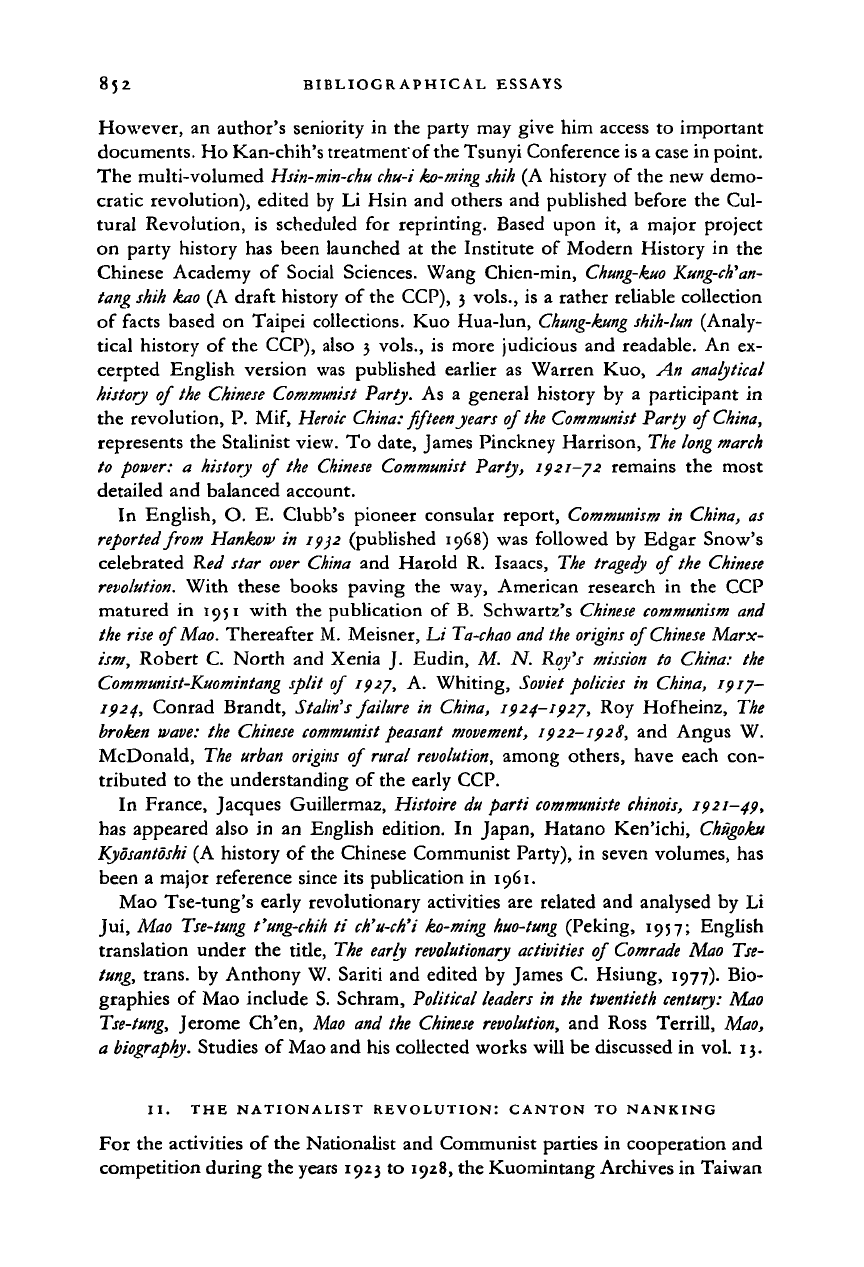
852 BIBLIOGRAPHICAL ESSAYS
However, an author's seniority in the party may give him access to important
documents. Ho Kan-chih's treatment'of the Tsunyi Conference is a case in point.
The multi-volumed
Hsin-min-chu chu-i ko-ming shih
(A history of the new demo-
cratic revolution), edited by Li Hsin and others and published before the Cul-
tural Revolution, is scheduled for reprinting. Based upon it, a major project
on party history has been launched at the Institute of Modern History in the
Chinese Academy of Social Sciences. Wang Chien-min,
Chung-kuo
Kung-ch'an-
tang shih
kao (A draft history of the CCP), 3 vols., is a rather reliable collection
of facts based on Taipei collections. Kuo Hua-lun,
Chung-kung shih-lun
(Analy-
tical history of the CCP), also 3 vols., is more judicious and readable. An ex-
cerpted English version was published earlier as Warren Kuo, An
analytical
history of
the Chinese Communist
Party. As a general history by a participant in
the revolution, P. Mif,
Heroic
China:
fifteen
years of
the Communist
Party of
China,
represents the Stalinist view. To date, James Pinckney Harrison, The
long march
to power: a history of the
Chinese
Communist Party, 1921-72 remains the most
detailed and balanced account.
In English, O. E. Clubb's pioneer consular report,
Communism
in China, as
reported from Hankow in 19)2 (published 1968) was followed by Edgar Snow's
celebrated Red star over
China
and Harold R. Isaacs, The
tragedy
of
the Chinese
revolution.
With these books paving the way, American research in the CCP
matured in 1951 with the publication of B. Schwartz's
Chinese communism
and
the
rise
of
Mao.
Thereafter M. Meisner, Li
Ta-chao and the origins
of
Chinese
Marx-
ism,
Robert C. North and Xenia J. Eudin, M. N. Roy's
mission
to China: the
Communist-Kuomintang
split of 1927, A. Whiting,
Soviet policies
in China, 191J-
1924, Conrad Brandt,
Stalin's
failure in China, 1924-1927, Roy Hofheinz, The
broken
wave:
the
Chinese communist peasant
movement,
1922-1928, and Angus W.
McDonald, The urban
origins
of rural
revolution,
among others, have each con-
tributed to the understanding of the early CCP.
In France, Jacques Guillermaz, Histoire du parti
communiste
chinois,
1921-49,
has appeared also in an English edition. In Japan, Hatano Ken'ichi, Chugoku
Kyosantoshi
(A history of the Chinese Communist Party), in seven volumes, has
been a major reference since its publication in 1961.
Mao Tse-tung's early revolutionary activities are related and analysed by Li
Jui,
Mao
Tse-tung
t'ung-chih
ti
ch'u-ch'i
ko-ming
huo-tung
(Peking, 1957; English
translation under the title, The
early revolutionary activities
of
Comrade
Mao Tse-
tung, trans, by Anthony W. Sariti and edited by James C. Hsiung, 1977). Bio-
graphies of Mao include S. Schram,
Political leaders
in the
twentieth
century:
Mao
Tse-tung, Jerome Ch'en, Mao and the
Chinese
revolution,
and Ross Terrill, Mao,
a
biography.
Studies of Mao and his collected works will be discussed in vol. 13.
II.
THE NATIONALIST REVOLUTION: CANTON TO NANKING
For the activities of the Nationalist and Communist parties in cooperation and
competition during the years 1923 to 1928, the Kuomintang Archives in Taiwan
Cambridge Histories Online © Cambridge University Press, 2008
